HANAPEPE — At noon Wednesday, county park rangers put up signs on trees and pavilions and stuck stakes into the ground notifying all those at Salt Pond Beach Park the facility is closed until further notice and all those found at the park would be “subject to arrest for criminal trespassing.”
The county cites Kaua‘i County Code 19-1.5, which states the director of the Department of Parks &Recreation may close parks as “necessary for the health, safety or welfare of the public” as the reason to close, and Hawai‘i Revised Statutes 708.814.5 states criminal trespass onto public parks and recreational grounds as a warning that it is an offense against property rights.
Some Salt Pond residents had already packed up their cars or shopping carts, had friends pick them up, or biked away as much as they could hold in their baskets.
But about an hour after those signs went up, many of those who have lived at the park under the county’s Shelter-In-Place pandemic program for the houseless, and those who came to stand in solidarity, congregated to the center pavilion by the bathrooms to talk about the closure and their rights.
“We talk about the acknowledgment of our rights so much because everybody within the state and everybody on the other side would feel free if we all acknowledged that,” Kamuela Gomes said.
Gomes is talking about Hawaiian sovereignty rights, the right to be on Hawaiian soil.
“When we can get to the core of the land title and jurisdiction issue, it is the basis of remedy,” Gene Tamashiro of Natural Law Hawai‘i said. “We have an important future to protect. We have keiki to protect. We have ‘aina to protect.”
Salt Pond acted as a Shelter-In-Place site where the houseless community could legally live at certain county parks through a permitting program through the county during the pandemic.
The program started in March 2020 as a way to contain the vulnerable transient population, which was recommended by the U.S. Centers for Disease Control and Prevention. Over 200 people utilized the program in the 15 months it was open throughout the island at five county-owned parks, which included ‘Anini and Anahola beach parks, Lydgate Park in Wailua and Lucy Wright Park in Waimea.
With this park’s closure and the dissolution of the program, many individuals and families have nowhere to go.
Strain on facilities
The county did not provide updated permit numbers for how many the county had accounted for at Salt Pond. However, in an earlier request, officials stated that the county would only permit 50 people at Salt Pond, due to neighboring encampments putting a strain on facilities.
County Managing Director Michael Dahilig called the Shelter-In-Place program an “aggressive and innovative measure” used to contain COVID-19 by “reducing vectors.”
“However, given the health protections available to the broader community like vaccines, and the decrease in disease risk, it is time to revert our shared park spaces back to normal civic use after over a year of this initiative,” Dahilig said.
“We thank the public for its
patience as we have gradually wound down this health measure, and it is now time for everyone to safely enjoy our parks.”
The Shelter-In-Place program was always meant to be temporary, County Housing Agency Director Adam Roversi said in a June statement. The county, as well as nonprofits, including Kaua‘i Economic Opportunity and Catholic Charities Hawai‘i, which both provided funding for airline tickets for the houseless, have tried to offer alternative options as the parks closed.
“The county has funded a $500,000 rental-assistance program specifically to provide rental payments for homeless individuals who have been living in Shelter-in-Place locations,” Roversi said.
“We have a waitlist of potential applicants generated during our outreach events, and our partner Women In Need is currently working through applications to place people in housing. We expect this funding to house between 15 and 20 homeless families for one year.”
Julie Kauakahi had lived at Salt Pond in 2014 with her husband and their children. It took her three, 120-day opportunities with housing vouchers before they were able to find a place that would work. But she doesn’t forget where she came from.
Kauakahi does outreach at various encampments, and offers resources and help to many who are family.
Kauakahi suggested the county offer more options that meet people where they are, and in many cases that’s those who don’t have identification or have felony records. She said offering a step before transitional housing and readiness courses could break the cycle of housed to houseless.
County Councilmember Felicia Cowden arrived early in the day to Salt Pond, as she has for all of the county beach park closings.
“I have endeavored to come to these implementations of what our (county) policy is,” Cowden said. “It is a point of hardship, especially for the residents, but also very difficult part of the job for our rangers.”
Cowden took virtual meetings in the pavilion on Wednesday, including one with the county administration, to discuss her ideas for county policy to work with the houseless community.
“In each moku, I would like to create self-empowering communities that work with the community associations of that area,” Cowden said.
Cowden envisions the two groups would come up with a design and plan in partnership on an agricultural property for improved camping with bathrooms, kitchen facility and wastewater, and residents can utilize and improve the land.
Since the closings
Recreational camping opened on April 30 at ‘Anini and Anahola beach parks, costing $3 per person per night, with fees waived for Hawai‘i residents and those under 17 years old. Since then, 662 permits for 2,346 individuals were issued for ‘Anini Beach Park, and 221 permits for 663 individuals were issued in Anahola, as of Monday.
The county will not longer offer camping at Lucy Wright Park in Waimea.
Lydgate Park closed at the end of May after requests for an extension from the county were denied.
“It was considered, but ultimately, it was not approved,” Department of Parks &Recreation Director Patrick Porter said in a June statement. “We’ve had a transition plan in place to discontinue the temporary Shelter-In-Place program for many months now. And occupants of all parks were previously, and repeatedly, notified by our park rangers, Housing Agency officials and services providers in the months and days leading to the impending closures, as early as February.”
Some houseless individuals relocated to state Department of Hawaiian Home Lands property in the vicinity of Salt Pond after the closure, but many have since moved.
Recreational camping at Lydgate remains closed as the county continues to clean it up.
Rehna “Pueo” Fox lived at Lydgate Park, and has been roaming since its closure. Fox came to Salt Pond Wednesday to support the residents there.
“I’ve lived here 54 years, and there’s no aloha right now,” Fox said. “No welcome. I’ve never dreamed of this.”
•••
Sabrina Bodon, public safety and government reporter, can be reached at 245-0441 or sbodon@thegardenisland.com.
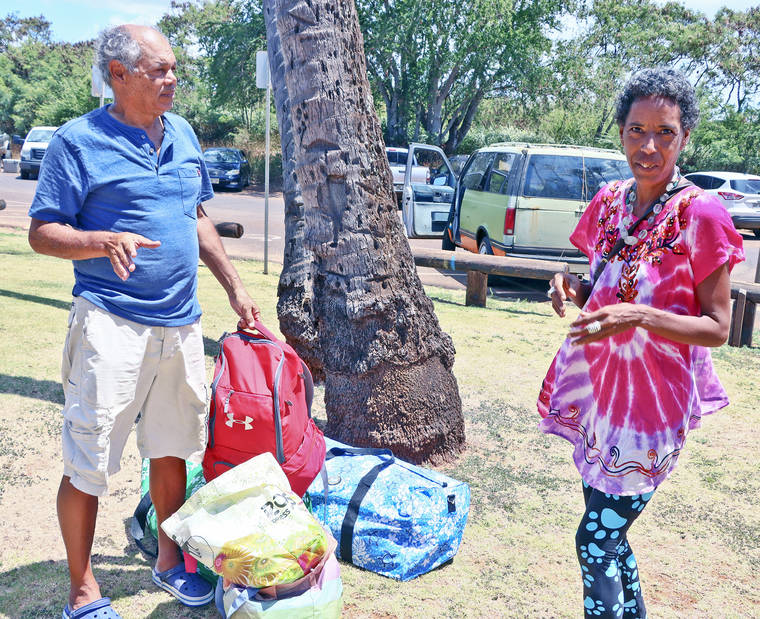
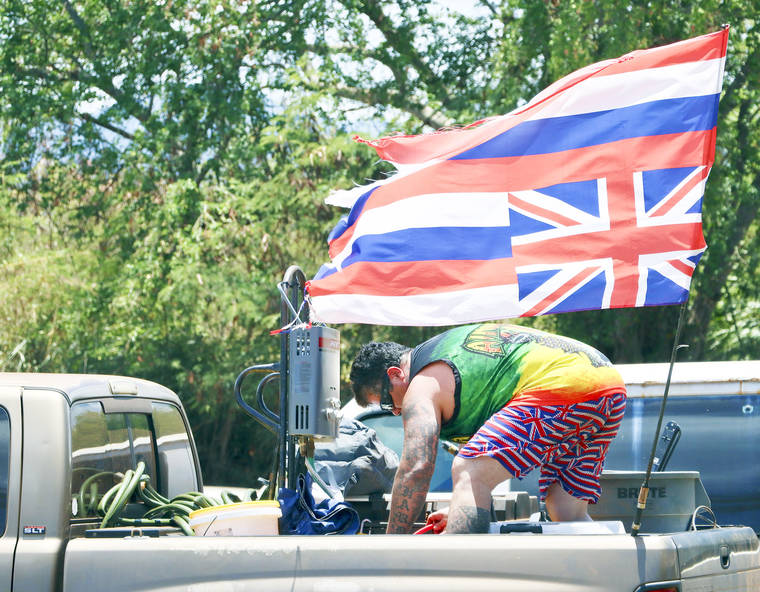
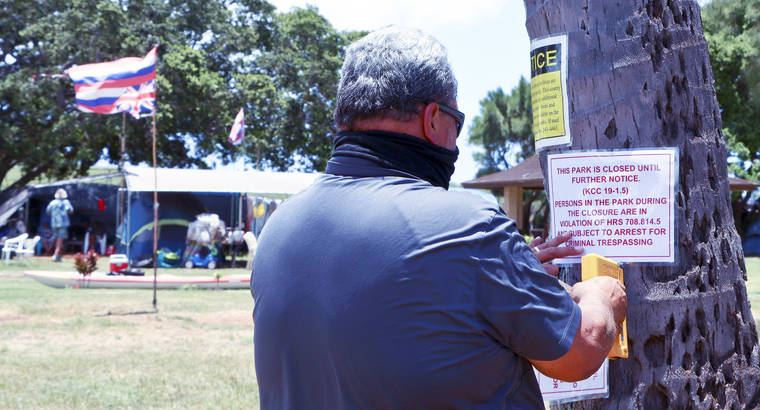
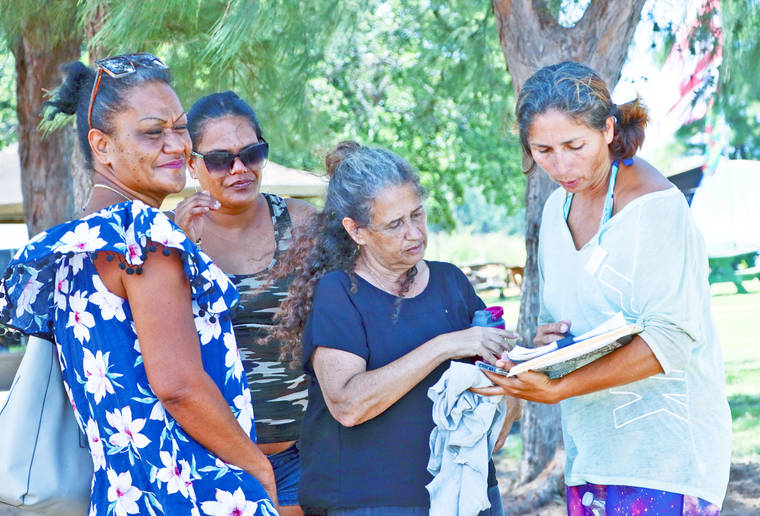
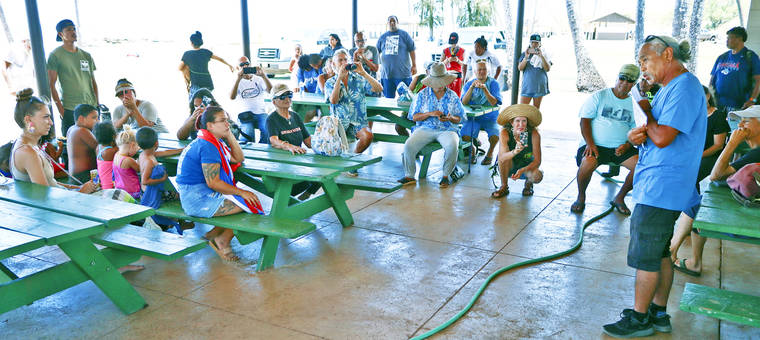
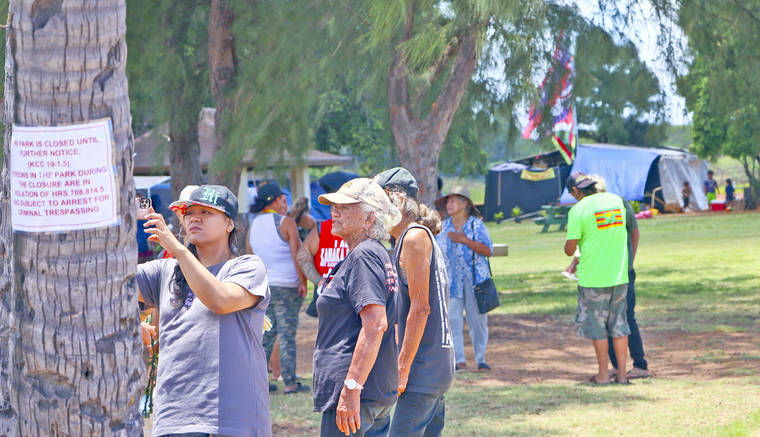
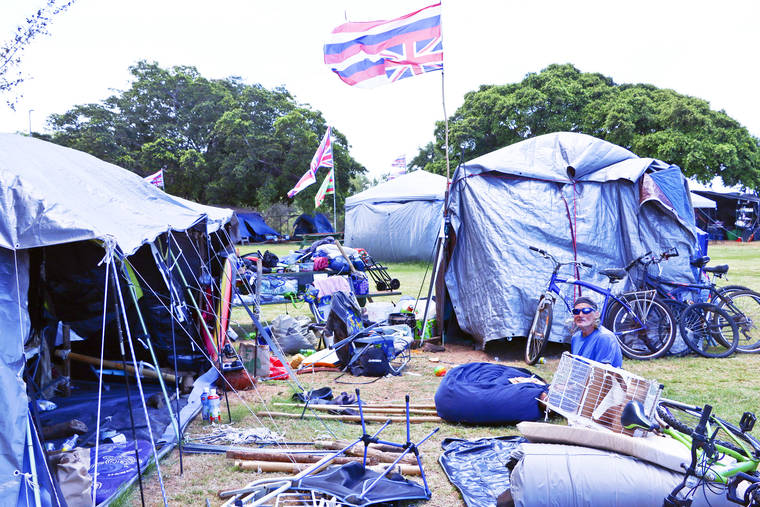


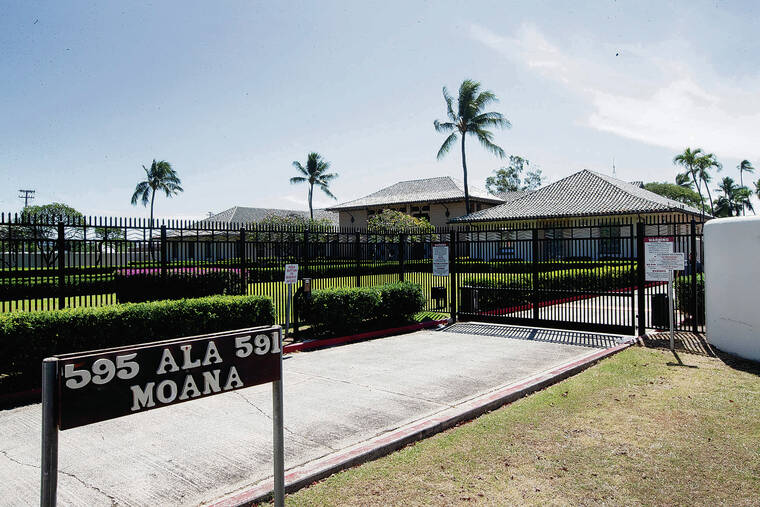


What a conundrum. I actually happened to be at Salt Ponds just as this all was happening. The tension was high with a lot of flags flying and signs. With the housing situation so tight already, tourists coming back and landlords wanting that short term bonanza, it leaves very little places for these people to go. It is very sad to see this happening. Gives me hope with Felicia on the job. May require out of the box thinking
Sigh. Always the same bunch of jobless whiners.
What we ask of the press is accurate unbiased reporting. What we ask of our government is to have a plan, even if we do not agree with either one. They have not closed Lydgate. They closed the campground. Since then, with no plan and no reporting, the homeless population there has been allowed to take over and occupy the rest of the park. No plan, no enforcement of rules and laws, no reporting. We want our parks back!!!
There IS aloha, if you follow the rules and go to the shelters. If you work and try to get off drugs. If you choose to stay on drugs, then you are on your own. Your choice. Don’t fall for this rubbish about Hawaiian homelands, etc…..
Anole Aloha!!!
These obscenely overpaid (unlawful occupation ) fake employees always sling our most sacred word “ALOHA” at us while pillaging our lives, land, sea and air to the highest bidder and causing further divisions among local people and visitors!
The County is policing and removing the people who are desperately trying to protect the Hawai’ian Kingdom and our rights…. the only underlying purpose of these events is to distract from the sole purpose of the unlawful occupation and implementation of making sure that the US MILITARY INDUSTRIAL WARFARE CONTINUES WITHOUT A HITCH.
I SAY NO ALOHA, HAOLE MUST GO HOME….
THIS IS NOT AMERIKKKA….
read the Plan underway for the Return of Aloha here….
HAWAIIANKINGDOM.ORG
It’s sad to think that people as a society can’t allow people to live on the earth freely. Conforming to the norms of society with having a job and paying rent is nonsensical. If a person can provide for their own well being and live a satisfactory life without using or harming others than we should not stifle them. The treatment of the homeless is a disgrace. Shame on you County of Kaua’i.
Pay your way, and live as freely as you want. That means conforming to the “norms of society.” Otherwise, don’t expect handouts most of us that work don’t qualify for.
Well maybe you guys can get a place for a better living condition. This is America. The rich get richer, and the poor get poorer. I realize that this place is a church haven. So pastors pray over you and you’re spiritual. And owning thing is not your speed. Try your best to own things. Like a bike. Or a car. Or even clothes. It’s the life of abundance. Material wealth. If you want it, go after it. The richer boys.
Sorry. But I know a lot.
Parks are for everyone to use. Not just the “Poor me, give me more” group. Have you seen the dumps these people have made of our beautiful parks & Homelands? Get a life! Move on!!!!
Look on Facebook for the portable home for the homeless. There is a build it yourself bike trailer that acts like a towable bedroom that will improve your life immensely. Its a little book on building a device that changed my life and helped me when I needed it the most.
It is my gift to those who need it most. Its full of surprises.
There is no easy answer to this problem. I was hoping Keith Robinson would step up and dedicate a bit of land for these people, who knows how long we even going be alive given the circumstances we are in with the whole Great Reset, or the Pole Shift event that is happening. I know some of these people are long time residents. Is hard, when economy was decimated by the COVID. I am grateful for the little security that I have. And feel their pain.
How can everyone “safely enjoy the parks” if they’re closed?
Pioneering Polynesians still strike out from their villages and go upriver to suitable new village lands and set food to ground, water to drink up river from water to bathe, and repeated what others before them did successfully for sanitation of refuse and excrement.
The founder of the village was the highest chief and had a special chief name for only village founders, and their down line.
It was a lot of work, and suitable persons and families followed the founder and shared in the work and a new home (land) to call theirs forever.
And thus we have here these early villages in prime locations both mauka and makai, always near clean flowing water and suitable land to grow food. These villages are now towns, but too often some fish only with the round silver hook…!
It is weakness shown that those who do not want to participate in working mundane jobs both private and gov’t waiting decades for retirement, but instead choose living off the taxes of the mundane workers, or choose the devil in drugs, and cannot make the strength to go inland and upland to do their own thing, their own village, a new land.
I hope there are not unscrupulous, predatory men loading up vulnerable, homeless women with nowhere else to go at salt pond beach park.
From what I understand, there has been a group of native/local Hawaiians holding down that spot for some years now. They cleaned up quite a bit over there. They should be able to stay.
On two separate occasions today I saw a woman who was homeless and very unkempt. This woman as was the other one have real mental issues. They’re probably schizophrenic, why isn’t our government helping in these people?
Everyone has a right to decent job and affordable housing. Let those good folks stay there. Their children don’t deserve anymore trauma. Our society must address the wrongs perpetuated on the Kanaka and all those being forced to survive on the fringes.
We need more living options…. Kauai it is time to allow ADU on Ag Zoned lands- this would be of great help to our farmers and folks needing a simple place to live. The many layers of building restrictions has contributed to this BIG Problem. It is only going to get worse once the Governor allows home evictions come August.